Living In Thailand Blog
Monday 14th February 2011
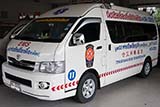 There was an interesting report on the Al Jazeera news network last night about the independently financed rescue teams that attend to road accidents in Thailand. The report was about Bangkok but we have these in the provinces too. One of my ex-students was a rescue volunteer.
There was an interesting report on the Al Jazeera news network last night about the independently financed rescue teams that attend to road accidents in Thailand. The report was about Bangkok but we have these in the provinces too. One of my ex-students was a rescue volunteer.
The statistics were also quite interesting. There are 13,000 road deaths in Thailand each year. The statistic I had heard previously was 40 a day but 13,000 a year is about 36 a day.
Thais are so good at killing themselves and other people in road accidents that the government doesn't need to worry about population control, or have a 'one-child' policy like China.
China's one-child policy - success or failure?
Another statistic that was highlighted is that there is only one ambulance in Bangkok for every 67,000 residents.
These independent rescue teams have sprung up to fill the gap caused by the lack of ambulances. I couldn't work out before why people would volunteer their time, and pay for the ambulances and equipment themselves. The Al Jazeera report shed a little light on this.
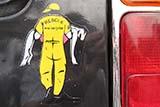 Apparently, the rescue teams used to have a reputation as 'body-snatchers'. The first team to get to an accident would take the victim (dead or alive) to a hospital where they would get a commission. Competition was so strong that they would fight to get victims. This sounds very Thai.
Apparently, the rescue teams used to have a reputation as 'body-snatchers'. The first team to get to an accident would take the victim (dead or alive) to a hospital where they would get a commission. Competition was so strong that they would fight to get victims. This sounds very Thai.
Another way they make money is from people donating money (and time) in order to make merit. As I wrote previously, making merit is of the utmost importance to Thais. The teams might be self-financed but they do receive donations.
There is also a competitive element. Each team takes gory photos of the accident victims and compares them with other teams. My local rescue team displays its photos on two large notice boards inside the rescue centre. Viewing is not advised before breakfast and you need a strong stomach.
As I have pointed out previously, Thais have a very strange relationship with death and they are quite macabre. Hospitals put their cadavers on display for young students to view during our annual university 'Science Week', some temples display cadavers for meditation purposes, and Thai newspapers often have gory photos of dead bodies splashed over the front pages.
Here's a link to the Al Jazeera report on YouTube:
Thailand's "body snatching" volunteers
Sunday 13th February 2011
A female Malaysian friend took a trip to some islands off Trang recently and stopped in town for a few hours to say hello. We hadn't met for a while so had lunch and caught up with each other's news.
I took my wife along and afterwards she wanted to know if Jennifer was going to meet friends. I told her no; she was travelling alone. Bpom, my wife, found this almost incomprehensible.
Jennifer describes herself mockingly as banana Chinese - yellow on the outside and white inside. She's ethnic Chinese but very Western in her behaviour and thinking.
Lots of Westerners travel and live alone but this is highly unusual for Thais. Thais normally travel in quite large groups and they seldom live or eat alone.
When I lived with my parents I had a strong desire to break free and gain my independence. Many Westerners do. However, this desire to be independent isn't the same with Thais. If anything, it is quite the opposite. There seems to be a desire for mutual dependence.
Thai people seem to want to have dependence on other people, and they want people to be dependent on them. Since I have lived in Thailand I have seen various examples of this behaviour in action.
After the big flood in November, everyone's house was in a mess. Once the clean up operation began I just focused on cleaning up my own mess. What happened though was that members of Bpom's family arrived at our house to help clean up, even though their own houses needed to be cleaned up.
The expectation then was that the people they had helped would help them. Rather than everyone being independent and just doing their own work it seemed to be preferable to help each other.
When I was up in a poor part of Isaan some years ago I saw a house being built and it appeared that everyone in the village was involved. There were lots of people working on it. My assumption was that when anyone needed something doing, then everyone chipped in to lighten the load. This made life easier for everyone and also strengthened the community spirit.
Where we live now, the doorbell often rings and it is a neighbour with a plate or two of food. If they cook something, they give us some too. My wife does the same. I helped a student today and she brought some sticky rice and mango to say thanks. It was too much for us so some went to our neighbours. Food gets passed around all the time.
I remember a long time ago hearing a story about heaven and hell. In both places there was lots of delicious food but the only things to eat it with were extremely long chopsticks. In hell everyone was hungry because they wanted to feed themselves but they couldn't - the chopsticks were too long. In heaven everyone was happy because they were using the long chopsticks to feed each other.
Community spirit is often at its best in times of adversity. We hear about the great community spirit that existed in London during WW2 when Nazi Germany was doing its best to destroy the city.
People always pull together when life gets tough. We saw this in Thailand after the tsunami and after the flooding.
The majority of Thais are quite poor and life isn't easy for many. They pull together to make life easier. They are more dependent on other people than most Westerners - which probably explains the lack of self-confidence with many Thais - but if everyone was super independent the world wouldn't be a very pleasant place to live in.
With many aspects of Thai cultural behaviour there are big differences compared to the West. I can often see merit in both sides. Neither is necessarily right or wrong, but normally both are a little too extreme. In most cases, somewhere in the middle would be just about perfect.
Saturday 12th February 2011
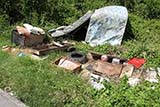 Teaching gives you lots of insights into how Thais think and behave that you probably wouldn't get if you didn't teach. Sometimes I deliberately set exercises to elicit thoughts and ideas from my students. For example, the "If I were Prime Minister, I would ..." exercise proved to be very interesting.
Teaching gives you lots of insights into how Thais think and behave that you probably wouldn't get if you didn't teach. Sometimes I deliberately set exercises to elicit thoughts and ideas from my students. For example, the "If I were Prime Minister, I would ..." exercise proved to be very interesting.
At other times, interesting things come out while simply doing standard text book exercises. Today, my young students had to look at six pictures of people carrying out various crimes and infractions. They then had to rate each one according to how serious they thought it was.
It was clear to me that the most serious case was the person driving while drunk. However, the Thai kids thought that eating an apple in a supermarket without paying for it was worse than driving under the influence.
At the other end of the scale they thought that dropping litter in the street and cheating in exams weren't really worth bothering with, and that these things were quite acceptable.
After living in Thailand for a number of years none of this surprised me. It simply confirmed that the Thai thought process starts at an early age and that nothing much changes when Thais go into adulthood.
There's a small piece of waste ground opposite my house and it is used by the locals (including my next door neighbour) as a rubbish dump. It looks disgusting. There's a rubbish bin 40 yards further but the Thais can't be bothered to use it because - according to Thais - it's a long way.
At the end of the street, also 40 yards away, is a small shop and when my neighbour visits the shop he goes on his motorbike. To me, going such a short distance any way other than walking would be unthinkable but what I have found since living in Thailand is that I think very differently to Thais.
Friday 11th February 2011
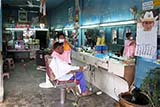 I had probably my best ever haircut in Thailand today, and it was also the cheapest.
I had probably my best ever haircut in Thailand today, and it was also the cheapest.
There are a plethora of hair cutting establishments in Thailand but despite this I have never had much luck getting a good basic haircut.
Many of the salons are full of girls who look like they are in a fashion parade and there are lots of gay men and ladyboys who prance around seeking attention.
In these places the pre-cut shampoo is normally the best part. They get you to lie down and the shampoo is actually a full head massage. It's great.
However, after that I have found the actual cut to be quite disappointing on many occasions. They faff around and you hardly feel that you've had a haircut. If my wife doesn't notice anything different with my hair just after I've had it cut, then I know that they couldn't have done much.
Many of these places also overcharge foreigners. There are no fixed prices and when you ask how much, it is more than likely that you will get a higher quote if you are a farang.
I went for another cut last week and it was the same thing. After just a week I felt like getting another haircut. The weather is getting very hot now and long hair is uncomfortable.
Today I decided to give the salons a miss and go instead to one of the many places in Thailand that only cut men's hair. They are like old-fashioned barber shops and normally run by men, but the one I went to today was run by a girl.
The shop itself wasn't very plush but it was situated on a corner and, being completely open with the wind blowing through, it was very comfortable.
 There was no relaxing head massage shampoo to start off with but that was the only negative thing. She powdered my neck with some cooling powder which felt good. She then gave me a very efficient haircut.
There was no relaxing head massage shampoo to start off with but that was the only negative thing. She powdered my neck with some cooling powder which felt good. She then gave me a very efficient haircut.
Next, she removed all the hair in the wrong places that men start to cultivate after a certain age. My ears now look more human-like, as opposed to those belonging to a werewolf.
It was late afternoon and while doing this she noticed the five o/clock shadow on my face and asked if I wanted a shave. Sure. It's been a long time since I had someone else shave me but it was very good.
When she had finished I got a shoulder and arm massage. She then applied alcohol to my face, which was a new experience for me. It stung but afterwards I felt quite invigorated.
And how much for all this service? The charge was Bt60. I gave her Bt100. I get quite irritated with farang tourists giving stupid tips and driving up prices in tourist resorts but I just felt that Bt60 was too cheap for the service I had received.
The salons will charge you a lot more and I've read about a scam in tourist places where they will use an expensive conditioner, which you didn't ask for, and then charge a lot extra. This kind of scam is reserved for foreigners.
The worst sin in Thailand is greed. Greedy Thais really aren't pleasant at all but when you encounter Thais who aren't greedy the magic starts to return to the Land of Smiles. It's an unfortunate fact that the huge influx of foreigners into Thailand in the last 30 years has made a lot of Thais very greedy. The only way to avoid greed in Thailand these days is to find areas where there aren't any foreigners.
 I seem to remember writing that I witness about three road accidents a week in Thailand. On average that's about right; sometimes there are more and sometimes less.
I seem to remember writing that I witness about three road accidents a week in Thailand. On average that's about right; sometimes there are more and sometimes less.
Of course, a hell of a lot more take place without me being there to see them.
Here is today's.
The most obnoxious road users in Thailand are pickup truck drivers, young male motorcyclists, and minivan drivers. At the weekend a pickup truck driver decided to back out into the road without bothering to look out for other cars as I was giving Bpom a driving lesson in a quiet rural location. He missed us by about two inches.
I then got furious with a minivan driver who was trying to get ahead of me in traffic by undertaking and then cutting in. The next day I heard a girl scream as the motorbike she was on just missed colliding with another motorbike.
All of these incidents and near misses were completely unnecessary. Some of the reasons for so many accidents in Thailand are a lack of effective basic driver training, stupidity, no consideration for other road users, macho behaviour, driving far too fast, drunk driving, no regard for traffic laws or road signs, no law enforcement, no effective fines or other deterrents, and a selfish "Me first" attitude.
Thai drivers don't like stopping at intersections. Even if they don't have right of way they simply drive straight through without stopping. Most of the time they manage to avoid one another but inevitably there will be times when they don't.
This is what happened in the accident in the photo. The pickup truck driver and motorcyclist decided that they both had right of way at a four-way intersection and of course they hit each other.
The motorcyclist got taken to hospital and the pickup driver now needs to waste time getting his truck repaired. All because neither wanted to stop for a few seconds.
The driving standards here are an absolute disgrace.
Saturday 5th February 2011
The TV at the restaurant where we ate last night was tuned into some kind of a Yellow Shirt rally in Bangkok and all I kept hearing was the Thai word for Cambodia - Gum-poo-chaa.
It was very similar to the Red Shirt rallies last year in that the speakers were trying to work the crowd up into a frenzy. There were frequent bouts of clapping and cheering from the enthusiastic crowd.
When I returned home I saw this story on the BBC news site:
Troops exchange fire on Thai-Cambodia border
I can understand why Thailand is upset about this but the situation needs to be put into perspective otherwise it could very easily get out of hand very quickly. With so many real problems in Thailand that desperately need to be solved, this long-running border dispute is currently the main issue in Thailand for many Thais.
It's an old dispute but the recent problems have been caused by the temple securing a World Heritage listing in 2008; something that didn't go down very well with Thailand.
The situation continues to get worse.
Thai soldier killed in Cambodia border clash
Friday 4th February 2011
The travel industry is huge and a vast amount of money is involved. The whole industry revolves around selling dreams. Once the dreams are sold then the travel related services can be sold. Money is what it's all about.
The basic premise is that people's lives are boring or unsatisfying wherever they are, but this can be remedied simply by going to somewhere else.
That's fine. I enjoy travelling and experiencing other places very much. I always have done, I suspect I always will do, and many other people feel the same way. The potential danger is when people start to look beyond a short trip and view a permanent change of location as the answer to all their problems. It isn't.
Simply changing location doesn't solve any underlying problems. This is worth remembering.
I was reminded about the 'dream selling' aspect of the travel industry while flicking through a Thai Airways inflight magazine recently. All the photos and flowery prose were designed to sell dreams, and of course once the dream is sold Thai Airways also wants to sell you a ticket to the places featured.
The whole magazine was one big advert. Thailand was described as the place where people smile from their hearts and there was no balance at all. I don't expect them to write about social problems, political unrest, insurgency and other issues, such as how many Thais make a living by ripping off tourists, or to publish crime statistics, but the biased style of writing irritated me slightly.
Anything that was even slightly unsavoury was omitted or twisted.
The magazine had an article about Thai food and described the small, potent chilis that are used a lot in Thai cooking.
พริกขี้หนู
prik kee noo
prik = chili
kee = shit/excrement (with a falling tone)
noo = mouse/rat/personal pronoun 'I' for a small child
Or mouse/rat shit chili.
I guess this description was too graphic for the sensibilities of the gentle Thai Airways passengers so it was translated as "Bird's Eye Chili". What an interesting translation.
Next time you eat at a Thai restaurant, ask for the following in your curry and see what happens:
พริกตานก
I think your request will be met with lots of confusion. My wife tells me there is a 'birdshit chili' but not a bird's eye one.
The Thai word kee is used a lot. Any kind of waste or excrement has the prefix kee (high class initial consonant and second tone mark so pronounced with a falling tone) and then the source of the waste. For example, kee hoo is earwax (hoo being the Thai word for ear).
However, the exact same word is used as a prefix to describe people who are given to/inclined/disposed to doing or being something. For example, the Thai verb 'to envy' (it-chaa) when prefixed with kee becomes the adjective 'kee it-chaa' meaning envious.
I have never been able to get a definitive answer as to what the derogatory Thai term for backpackers is. One version suggests that it is 'birdshit foreigner' (farang kee nok).
However, 'ngok' can mean 'stingy' and therefore 'farang kee ngok' could mean someone who is inclined to stinginess, as foreign backpackers are perceived to be.
When asked, my Thai friends tell me the former (birdshit foreigner). I think they're right but I can't be absolutely sure.
Thai is a tonal language and 'kee' pronounced with a low tone (same initial consonant but first tone mark) means 'to ride' (animal or bicycle). If you hear 'kee chaang' it can either mean riding an elephant or elephant shit depending on the pronunciation.
This type of play on words as a result of small differences in tone is something is something that Thais enjoy. When I attempt to speak Thai and inevitably get the tone wrong it often causes a degree of merriment. I do the same with Thais, for example when they try to say 'helicopter' and it sounds like 'Harry Potter'.
Many consonants in Thai have the same sound and so the same basic sounding words can be spelt using different letters and they all have different meanings. This is when Thai starts to get horribly confusing.
คี่
This spelling of kee with a low class initial consonant and the first tone mark also has a falling tone (just to make life easy). It means odd (as in odd number), single or one of a pair.
I find the Thai language fascinating and I really enjoy learning more but I don't think I will ever master it in my lifetime.
I should have some free time coming up at the end of the month. Ideally I'd like to explore some more places in the car but as my wife will be about to give birth I don't think she will be very happy if I announce I am going off for a few days.
I will need to be at home and in my free time I am planning to do some more work on my 'Learning to read Thai tutorials'. I've been wanting to do this work for a long time but time is always the enemy.
Thursday 3rd February 2011
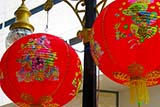 Chinese New Year is quite a strange time here. The vast majority of tourists are from Malaysia and Singapore (mainly Malaysia), and the vast majority of those Malaysian and Singaporean tourists are ethnic Chinese.
Chinese New Year is quite a strange time here. The vast majority of tourists are from Malaysia and Singapore (mainly Malaysia), and the vast majority of those Malaysian and Singaporean tourists are ethnic Chinese.
Many take the opportunity to cross the border during their holiday and therefore the tourist areas get very busy over CNY. Despite the vast number of hotel rooms, most centrally located hotels get fully booked a long time in advance.
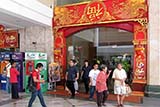 It's a good time for Thais who work in the tourist trade. The T-shirt vendors, restaurant owners and massage shops will be enjoying the extra money that is coming in.
It's a good time for Thais who work in the tourist trade. The T-shirt vendors, restaurant owners and massage shops will be enjoying the extra money that is coming in.
On the other hand, anything that isn't tourist related goes very quiet.
Most local residents in this area are Thai-Chinese. I'm not sure exactly how many but I've heard estimates from 50-80%. The proportion of business owners who are Thai-Chinese is even higher and many businesses close for several days - maybe up to a week - for CNY.
I find it a little frustrating because many of the restaurants and shops I use regularly are closed and it is necessary to find alternatives. Still, I get a day off work so no complaining.
I am in Thailand because my life had failed in the UK.
By the time I hit 40 I was forced to accept that I had never been able to get the life I'd wanted, and at that age there was no chance I would ever get the life I wanted. There was only one thing left to do - move to another country and start again.
If I wanted to, I could tell you how successful I was in my career, how much I earned, how I owned nice cars and houses, etc., but if everything in life had worked out how I wanted I wouldn't be in Thailand.
With due respect, most other foreigners I've met in Thailand have been here for the same reason. If life had worked out really well in their home countries they would still be there, and not in Thailand.
There are many different types of foreigner in Thailand. Some people turn a failed life into a great life in Thailand, but there are others whose lives will always be failures wherever they go.
The thing about foreigners living in Thailand is that no one ever admits to failing. Every foreigner you speak to was (in their view) really successful back home, really successful now, and will be really successful in the future ... even though they're living in a Bt4,000 a month rented room and obviously have no money.
I met a British guy here a couple of years ago who claimed he was a highly successful Internet entrepreneur. He told me was building a web site that would make huge amounts of money (even though the description of his on-line business made it sound like an illegal pyramid scheme), and that he'd owned sites in the past that attracted 20 million visitors a month.
He didn't say what these sites were or why he'd relinquished them. With that amount of traffic he would have been making some serious money and could have stayed at a fancy hotel instead of the grotty little guest house he was staying in. I chatted with him for a while and because I had some knowledge of what he was talking about I knew he was talking bull****.
I was looking at a web site about Thailand recently. The author writes in a very authoritative style and makes himself out to be an expert on all matters related to Thailand, as well as being a hotshot businessman. I didn't know much about the topics he wrote about so I gave him the benefit of the doubt.
But then I noticed he'd written a section about the Thai language; something I do know a little about. His claim to be able to read and write Thai also interested me.
I started to read and the description he gives of the etymology of a certain Thai word is completely and utterly wrong. He may not be a complete fake but he doesn't know as much as he pretends to and he gives out inaccurate information. Straight away, the credibility for everything else he had written took a big hit.
If you are new to Thailand, every foreigner you meet who has been in the country for more than six months will claim to be an expert on Thailand and all matters Thai. They will also claim to have been highly successful from wherever they came from.
If they are talking about things you know little about, you won't know how much is true.
If someone has been living in Thailand for a while, Thai language skills are a very accurate indicator of that person's real knowledge of the country. They are also an indicator of a person's general ability to learn new skills. If a person boasts about having lived in Thailand for 20 or more years yet can only speak a little and can't read or write, why should I believe him when he tells me how successful he is in other fields?
This isn't exclusive. Some people are very knowledgeable about Thailand without necessarily having any Thai language skills but whenever I run into a situation with an expat who's been in the country for many years and starts to tell me how much he knows about Thailand, I always listen out for the little language indicators that tell me how much he really knows.
There are some really great foreigners living in Thailand but there are also a lot of failures, losers, chancers, ne'er-do-wells and even criminals. It pays to be careful about the foreigners you get involved with. This is why I tend to be very cynical and wary of foreigners in Thailand who I meet for the first time.
Pound rises on UK construction data and when I checked yesterday the pound to Baht exchange rate had risen above 50 for the first time in ages.
There's a long way to go yet before the pound to Baht exchange rate reaches the mid-70's again, but it's better than the mid-40's. There is a feeling among some analysts that the Asian economies are overheating and that a correction is due. When this happens - and also when the UK interest rate starts to rise, which will be soon - the exchange rate should start to get a lot better.
Asia Faces Overheating, 'Hard Landing' Risks, IMF Says
This will be a great relief to anyone in Thailand whose main income is paid in UK pounds, such as me.
Thailand has never had very good relationships with its neighbours. The country was constantly at war with Burma for a long time and the Burmese completely sacked Ayuthaya (the Thai capital at the time) in 1767.
Not only did the Burmese destroy the city but they attempted to destroy everything related to Thai art, culture and history.
Thais are very proud of the fact that the country remained independent during the colonial period but for this to happen a lot of land was ceded to its neighbouring countries, all of whom were under colonial rule.
Thailand was also regarded as a convenient buffer state separating the British and French colonial powers, and that is another reason for the country never being colonised.
During WW2 Japan was the dominant force in Southeast Asia and Thailand was a Japanese ally. To reward Thailand, some of the previously ceded land was temporarily given back but after the war (when the Japanese were defeated and Thailand swapped sides) the land went back again.
From French Indochina this land included the Luang Prabang region on the right bank of the Mekong, the Champasak region opposite Pakse, and the provinces of Battambang and Sisophon; and from British Malaya, the states of Kedah, Perlis, Kelantan, and Terengganu.
Some Thais still bear a grudge about this and regard the land in question as having been stolen. A few years ago a Thai actress, Suvanant Kongying, was alleged to have claimed that Angkor Wat in Cambodia belonged to Thailand. This reulted in riots, flag-burning, and the burning of the Thai Embassy in Phnom Penh.
Cambodian crowd storms Thai embassy
More recently, there have been lots of problems over Preah Vihear temple on the Thai/Cambodian border. A team of French officers was assigned to survey the area and draw up maps in the early part of the 20th century. This was done in 1907 and the results handed over to Siam (as Thailand was then) in 1908. The temple was shown as being in Cambodia.
Thailand says that it never accepted the maps or, that if the maps were accepted, it was a mistake. Everything went quiet until the late 1950's when Thailand submitted the case to the Permanent Court of International Justice. In 1962 the court ruled that the temple belonged to Cambodia.
Temple of Preah Vihear (Cambodia v. Thailand)
The dispute went quiet again but then it became an issue (again) a few years ago. It's all political. As the BBC article points out, "The PAD has made nationalism, and in particular border disputes with Cambodia, a key part of its political platform."
A group of activists entered the disputed area and were subsequently charged with illegal entry into Cambodia and espionage. Two have now been sentenced to eight years in jail.
Cambodia finds two Thai nationalists guilty of spying
With all the very real problems that exist in Thailand it is sad that political groups continue to make irrelevant border disputes an issue.
Abhisit, who started off being a friend of the PAD for his opposition to Thaksin, is now their enemy because he takes a different view regarding Preah Vihear. Personally, I think he's the right man for the job but there are some people in Thailand who you just can't please. They will never be satisfied.
Thailand desperately needs some unity after being split apart politically in recent years. However, there remain political groups - each with their own agenda - who seem determined to continue to make trouble at all costs.
I can't work out the PAD (People's Alliance for Democracy). As the following article demonstrates, they say they want one thing but their actions go against what they say they want.
PAD protest: Just who is benefiting from rally?
Based on some of my comments above, if any of this is wrong let me know. I try to get my facts right but the history of Southeast Asia is quite complicated.
Wednesday 2nd February 2011
I left the UK in September 2003 and I've not been back. I don't have any plans to go back, but sooner or later events will take place forcing me to go back to sort out my affairs. I will go back to do whatever needs doing and then return to Thailand as soon as possible.
As far as I'm concerned, as soon as I can sever all my ties to the UK, the better. All that will matter to me there is my bank account and investments.
After being away for a while it's easy to forget about the bad stuff and instead just use selective memory to recall the good parts.
I've been moaning a lot about Thai drivers recently. My moaning is justified, but it's not perfect elsewhere - even in jolly old England. Driver training may be better, and the driving test a lot more difficult to pass, but I'd almost forgotten about all the aggression and the dreaded 'white van man'.
For a number of years I used to drive into East London every day for work. It wasn't very pleasant. This video has just reminded me of one of the things I don't have to deal with these days.
Helmet cameras capture bad driving
Everything in life is relative. One of my problems now is that since moving to Thailand I have done very little travelling to other countries. I think I need to start travelling again if, for no other reason, just to see how bad things are elsewhere.
After watching this video of the guy on a bike and his encounter with a white van man I am sure my next car journey in Thailand will seem a lot better.
Just as they are recovering from possibly the worst flooding ever, Australians are now preparing themselves for the worst storm in living memory:
Queensland braced for 'deadliest' storm Cyclone Yasi
Are these freak events, or are these extreme conditions we've all been seeing around the globe the start of a new era of severe weather? After our house was flooded in November, I am convinced it will happen again fairly soon and I am now determined to move to an area that doesn't flood as soon as is practically possible.
It's quite frightening.
This is the kind of news story that makes me feel really good about Thailand. Not only are the Thai police finding and arresting foreign drug traffickers, but they are also charging them with attempted bribery.
Two Nigerian men arrested for allegedly selling 13kgs of cocaine
Nigerian man nabbed at airport with 2 kgs of 'ice'
Perhaps these guys got fed up trying to entice innocent (but naive) foreigners into e-mail scams and decided to try to make money another way?
Tuesday 1st February 2011
Thais will sometimes use some quite advanced English vocabulary and you can easily be fooled into thinking that they are good at English. This isn't normally the case.
Language evolves around cultural behaviour and vocabulary has been developed over thousands of years to express the way people speaking a specific language think. Thais think very differently to Westerners and thus the language is very different.
For example, most Thais are not as independent as most Westerners and relationships with other people are very important in Thai society. Whereas English may only have one word for a particular family relative, such as aunt, Thai will often have several words depending on whether it is an older or younger, paternal or maternal relative.
Some words just don't exist in Thai. I have never been able to find a Thai word for 'recognise'. In situations where you may not recognise someone, Thais will simply use the word for 'remember'. However, the two words have different meanings.
English is a powerful language but certain words still get borrowed from other languages if a single word for a clearly defined concept doesn't exist, and one exists in another language. I sometimes use the German 'Schadenfreude' because there is no simple, direct equivalent in English. Karaoke is another well-known example.
This happens a lot with Thai and Thais will use English words and expressions when a convenient word or expression doesn't exist in Thai. This is why you can sometimes be fooled into thinking that Thais are good English speakers.
With the current problems in Egypt there are concerns that the social unrest will spread to other countries in the region. Thai news stations are using the English words 'domino effect' to express this concern. Last night I had to explain to my wife what 'domino effect' meant.
It's interesting how language develops and evolves. It changes constantly and we are always having to borrow or invent words to express new ideas and concepts. To 'google' something now is a perfectly acceptable verb, whereas a few short years ago it didn't exist.
As the world gets smaller and Thailand sees more of the rest of the world, words get borrowed to express ideas that didn't exist in Thailand until fairly recently. At the same time, words such as tuk-tuk and dting-dtong are quite handy Thai words for English speakers to borrow.
 There has been a lot in the news about ladyboys recently. I don't bother with TV because I consider it a waste of time, but whenever my wife turns the TV on it seems that there is always something about ladyboys.
There has been a lot in the news about ladyboys recently. I don't bother with TV because I consider it a waste of time, but whenever my wife turns the TV on it seems that there is always something about ladyboys.
Last week the Asian News Channel had a documentary in English about Thailand's 'third sex' and the big news at the moment is that a new airline, P.C. Air, will employ ladyboys as trolley dollies.
Third-sex hostesses ready for takeoff
The Miss Tiffany 2007 winner, Thanyarat "Film" Jiraphatpakorn, will push soft drinks and sandwiches up and down the aisle at 30,000 feet while trying to interest passengers in something from the inflight Duty Free catalogue.
Ladyboys are a common sight in Thailand, and not just strutting their stuff along Patong's Soi Bangla in the evenings and appearing in ladyboy cabaret shows. I see them all the time doing regular jobs. However, they do tend to gravitate towards certain professions.
There are a lot working in women's clothes shops and hair salons. A few weeks ago I was shampooed by a ladyboy before getting my hair cut. He was wearing a see-through blouse and proudly showing off his breast implants.
The wedding make-up industry is another ladyboy-dominated profession. In fact, I don't think I have ever seen a female wedding make-up artist.
On our wedding day, and also during the photo session before the wedding, several people made Bpom look beautiful and they were all ladyboys. Bpom, and also other Thai girls, tell me the ladyboys do a better job.
 The younger brother of the girl Bpom used to work with is a ladyboy. One of my ex-students comes from a large family and two of her younger brothers are ladyboys. They work on Koh Samui, where they dress as girls, but when they visit the family home they revert to being boys.
The younger brother of the girl Bpom used to work with is a ladyboy. One of my ex-students comes from a large family and two of her younger brothers are ladyboys. They work on Koh Samui, where they dress as girls, but when they visit the family home they revert to being boys.
There have been news stories in the past about university students demanding three toilets, one for each sex. Actually, there are more than three sexes.
I've talked to lots of Thais about this subject since I moved to Thailand and they seem to recognise and accept several gender types in addition to heterosexual males and females. There are gay males and females, boys who want to be girls, and girls who want to be boys.
The latter are referred to as 'Toms' as in the English 'tomboy'. They favour short, spiky hair (like teenage boys), boys' clothes, and they do their best to conceal their breasts. Sometimes I have genuine problems identifying sexes here.
I can tell immediately most of the ladyboys. The majority are far too big to be girls and they have a very distinctive walk and mannerisms. The large-bodied, butch ladyboys are referred to as 'ga-tur-ee kwai' by Thais. This translates roughly to Buffalo Ladyboy and it isn't very flattering. However, some are very convincing.
Ladyboys are a staple of Thai TV and soap operas. They normally provide the comedy element and they are very popular with Thais.
I don't have any problem at all with people wanting to be what they want. The only thing I object to is the way that many ladyboys seem to think that all farang men are interested.
 Many is the time that I've been sitting on a bus when a ladyboy gets on and makes a bee-line for me. They also stare a lot, wanting to make eye contact.
Many is the time that I've been sitting on a bus when a ladyboy gets on and makes a bee-line for me. They also stare a lot, wanting to make eye contact.
Some can also be quite volatile, and some can also be very greedy and pushy. The ones in Phuket encourage tourists to take photos and then demand Bt100 for each photo.
I have been to one ladyboy cabaret. As we left, we had to fight our way through the performers who were standing outside the exit holding their hands out for tips. They want to be girls but they have the strength of men and this can make them difficult at times.
Because of the huge number of ladyboys in Thailand, Thai doctors have become world experts in gender reassignment surgery. Many foreign boys who want to be girls travel to Thailand for surgery.
I've also seen quite a few foreign transvestites taking vacations in Thailand. Maybe they would have a tough time in their home countries but in Thailand no one bats an eyelid. Thais are very tolerant.
We didn't know what to eat last night so drove around the local neighbourhood on my wife's motorbike and found a place we hadn't eaten at before.
The food was average at best, not very filling, and they overcharged us by about Bt150. Fish is priced by weight and so there is no fixed menu charge. It was a small fish and both Bpom and I did a double-take when the bill arrived. Bpom's view was that we were charged the farang price because of me. This is standard practice in many places in Thailand.
I could have contested the bill but I know that in these situations I never get anywhere. I've tried many times before and it always ends the same way. They just defend the bill and never take anything off. After all, that would be a loss of face. I now use a different approach.
This restaurant is near our house. Had the price been fair we would have gone back again and given them more custom. I walked out feeling that I had just been ripped off and I will never go back again.
I don't care how much something costs as long as I feel I'm getting value, but if there's one thing I absolutely cannot stand it is people taken advantage and ripping me off - even if it's only for a few Baht.
As soon as I sense that I am being ripped off I never give that person any more business. Since moving to Thailand I've done this with one landlord and several restaurants.
On the other hand, I have given lots of repeat business to people who treat me fairly. The restaurant last night made a quick short term profit but they will be the losers in the long term.


